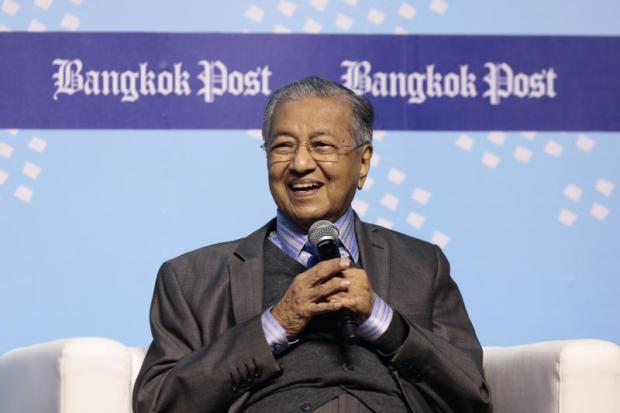
At the ripe old age of 92, Mahathir Mohamad has come out of retirement and is now set to become the world's oldest elected leader and the seventh prime minister of Malaysia after pulling off a surprise victory over his former apprentice Najib Razak on Wednesday.
It will be Dr Mahathir's second stint as premier after holding the role for over two decades from 1981 to 2003, during which time he also served as minister of finance and minister of defence for several years.
But how did he manage to make a comeback at such an advanced age? How are the mental gears still turning at such speed? How does he maintain his physical health and stay abreast of global events to lead an Asian powerhouse just eight years shy of his centennial birthday?
"I believe that it is important to keep yourself busy after retirement and also I don't smoke, I don't drink. When I eat, I don't eat so much and I eat a little, just enough to satisfy my hunger and do a little bit of exercise. That's all," he told the Bangkok Post during a visit to the paper's regional forum last November.
Dr Mahathir said he decided to come out of retirement after enough people begged him to save the nation that was becoming mired in cases of graft and other scandals -- such as those involving his political protege-turned-rival Mr Najib -- while living expenses spiral out of control.
"Initially I was trying to advise [them], to give my views and opinion but they were ineffective and eventually I had to leave my own party [Barisan Nasional] and, together with a few others, we formed a party [Pakatan Harapan] to run against the government party," he said at the time.
Regarding allegations against Mr Najib relating to his suspected embezzlement of Malaysia's state development fund 1MDB, which Mr Najib set up in 2009, Dr Mahathir said this appeared to be just the tip of the iceberg as there was a considerable amount of money found in his former protege's bank accounts that could not be accounted for.
All of these scandals and social ills "represent a lot of wrongdoing", Dr Mahathir said.
"There are many [troubling] issues among which is the high cost of living, the new unnecessary taxes, and the failure of the government to deliver a lot of things that were promised," he added.
"1MDB is difficult for rural people to understand but urban people can understand how the money has been stolen and misused," he added.
Dr Mahathir hinted at reforming Malaysia's police force and justice and governance systems as he believes the reason why the 1MDB allegations are not being investigated internally is because Mr Najib is "in control of the police and the attorney-general's office".
"If you report to the police, the police will arrest you, question you, put you in jail [and] charge you in court for terrorism, so there is no point making a report of corruption to the police," he said.
He also claimed three reports of corruption against Mr Najib's government made by Malaysia's central bank, anti-corruption agency and Public Accounts Committee were all omitted and made into official secrets to cover up the truth. Other critics have also slammed the Official Secrets Act 1972 (OSA) as a political tool to silence dissidents.
"People are unable to seek redress to the normal agencies of government because the separation of power between legislative, executive, and judiciary is now very big and the prime minister seems to be able to control both the executive as well as the judiciary," he said.
Dr Mahathir vowed to pursue the investigation against Mr Najib's involvement in the 1MDB scandal because "people would want to see him go to trial if there is any evidence that he has committed any wrongdoing".
"The law does not differentiate between a prime minster and ordinary people. If there is evidence that he has committed some crime then he should stand trial in a court of law. It is up to the court to decide what punishment should be given," he said.
He said that "as far as we know, he has done something wrong because even the US has practically accused him of money laundering, but that is in the US, not in Malaysia".
"We [Pakatan Harapan] will follow the rule of law. Whatever the law says, if there is somebody making an accusation, the law says it has to be investigated," he said.
Malaysia is also a party to some of the conflicts in the South China Sea.
In terms of China's growing influences in Southeast Asia, notably with its Belt and Road Initiative (BRI) and territorial claims in the hotly contested South China Sea, Dr Mahathir said he initially welcomed "China's increasing prosperity because it means we [as a region] can sell more to China and we can trade more with China".
However, he later changed his tune after watching Beijing adopt what seems to be a more aggressive expansionist foreign policy.
"But now China has these BRI projects by road and by sea, down the South China Sea to the Strait of Malacca, and they are claiming that most of [the sea] belongs to China," he said.
"Many parties including the Americans are not happy about that," he added. "We hope that this will not end up as clashes between America and China, as countries in the area will be affected."
Asean as an association should urge the US "not to use warfare" but to rely instead on diplomacy to find non-violent solutions to these and other conflicts with China, he said.
Meanwhile, as he basked in the afterglow of his surprise election win, which saw the Pakatan Harapan bloc clinch 122 out of 222 seats, Dr Mahathir was still waiting to be sworn in as of 7.30pm yesterday (Malaysian time), two hours behind schedule. As of press time no reason had been given for the delay.